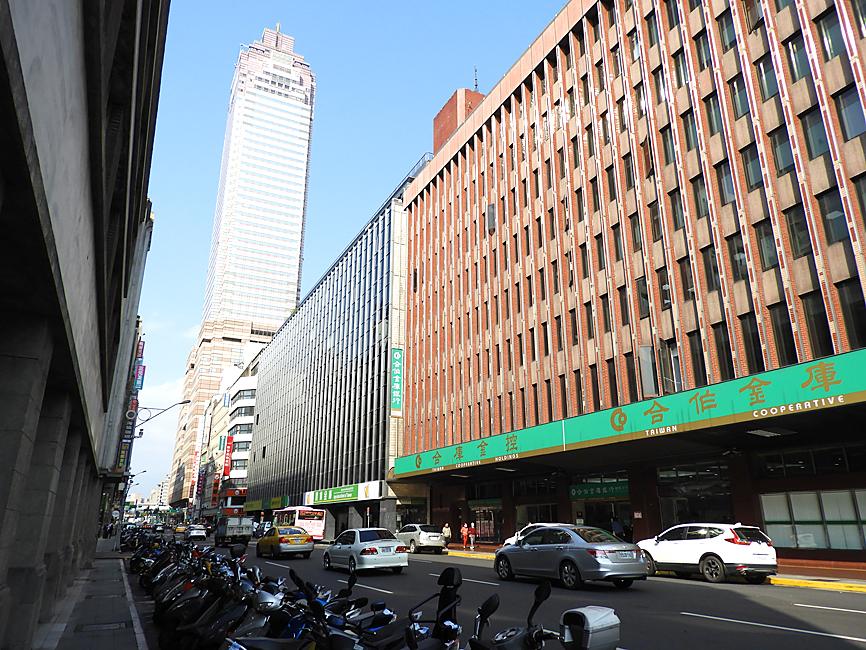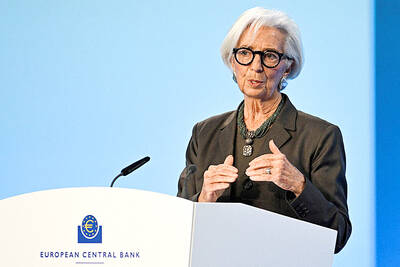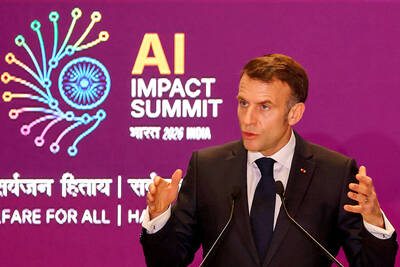State-run Taiwan Cooperative Financial Holding Co (合庫金控) is pursuing stable profit growth this year on the back of economic improvement at home and abroad, although the operating environment remains challenging, the company said yesterday.
The cautiously optimistic guidance came after the bank-focused conglomerate’s profit last year dropped 2.17 percent to NT$17.14 billion (US$606.45 million), which it attributed mainly to higher provision costs, and lower interest and fee income.
That translated into earnings per share of NT$1.24, compared with NT$1.29 in 2019.

Photo: Chen Yu-fu, Taipei Times
Taiwan Cooperative Financial chairman Lei Chung-dar (雷仲達) said that the results were “better than expected,” as its subsidiaries remained in the black, with stronger trust and securities operations, despite the COVID-19 pandemic.
The pandemic response diminished economic activity and resulted in wild swings in financial markets last year, prompting state-run financial institutes to slash their budget targets.
Interest spread narrowed from 1.409 percent to 1.18 percent for foreign and local currency operations, while net interest margin fell from 1.048 percent to 0.961 percent, company data showed.
The downturn is consistent with interest rate cuts by global central banks, officials said, adding that profitability measures have shown signs of stabilization since October last year.
Taiwan Cooperative Financial’s loan-to-deposit ratio was 69.92 percent in December last year, slipping from 76.06 percent a year earlier as the company took advantage of low funding costs to raise deposits, but adopted a cautious lending approach to avoid bad loans, it said.
That helped explain why the bad-loan ratio rose only 0.04 percent to 0.29 percent, it said.
The company would demonstrate more activity in lending operations moving forward, encouraged by positive COVID-19 vaccination progress and economic barometers, it said.
It said that its main subsidiary, Taiwan Cooperative Bank (合庫銀行), which generated 85.15 percent of overall earnings last year, would boost reverse mortgage operations and lending to urban renewal projects.
Housing transactions might hold steady after a solid pickup last year, supported by real demand, while unfavorable policy measures would drive investors to the sidelines, it said.
Securities and fund businesses, which benefited from investment gains last year, would increase positions in local shares, as domestic companies have given rosy earnings guidances, it said.
The fund arm is looking to increase sales of exchange-traded funds that are gaining popularity with local and foreign investors, it said.
Taiwan Cooperative Bank would seek to expand its business overseas, especially in Southeast Asia and the US, it said.
Overseas and offshore banking operations accounted for 36.7 percent of overall revenues last year, up from 31.13 percent a year earlier, it said.

European Central Bank (ECB) President Christine Lagarde is expected to step down from her role before her eight-year term ends in October next year, the Financial Times reported. Lagarde wants to leave before the French presidential election in April next year, which would allow French President Emmanuel Macron and German Chancellor Friedrich Merz to find her replacement together, the report said, citing an unidentified person familiar with her thoughts on the matter. It is not clear yet when she might exit, the report said. “President Lagarde is totally focused on her mission and has not taken any decision regarding the end of

French President Emmanuel Macron told a global artificial intelligence (AI) summit in India yesterday he was determined to ensure safe oversight of the fast-evolving technology. The EU has led the way for global regulation with its Artificial Intelligence Act, which was adopted in 2024 and is coming into force in phases. “We are determined to continue to shape the rules of the game... with our allies such as India,” Macron said in New Delhi. “Europe is not blindly focused on regulation — Europe is a space for innovation and investment, but it is a safe space.” The AI Impact Summit is the fourth

CONFUSION: Taiwan, Japan and other big exporters are cautiously monitoring the situation, while analysts said more Trump responses ate likely after his loss in court US trading partners in Asia started weighing fresh uncertainties yesterday after President Donald Trump vowed to impose a new tariff on imports, hours after the Supreme Court struck down many of the sweeping levies he used to launch a global trade war. The court’s ruling invalidated a number of tariffs that the Trump administration had imposed on Asian export powerhouses from China and South Korea to Japan and Taiwan, the world’s largest chip maker and a key player in tech supply chains. Within hours, Trump said he would impose a new 10 percent duty on US imports from all countries starting on

STRATEGIC ALLIANCE: The initiative is aimed at protecting semiconductor supply chain resilience to reduce dependence on China-dominated manufacturing hubs India yesterday joined a US-led initiative to strengthen technology cooperation among strategic allies in a move that underscores the nations’ warming ties after a brief strain over New Delhi’s unabated purchase of discounted Russian oil. The decision aligns India closely with Washington’s efforts to build secure supply chains for semiconductors, advanced manufacturing and critical technologies at a time when geopolitical competition with China is intensifying. It also signals a reset in relations following friction over energy trade and tariffs. Nations that have joined the Pax Silica framework include Japan, South Korea, the UK and Israel. “Pax Silica will be a group of nations